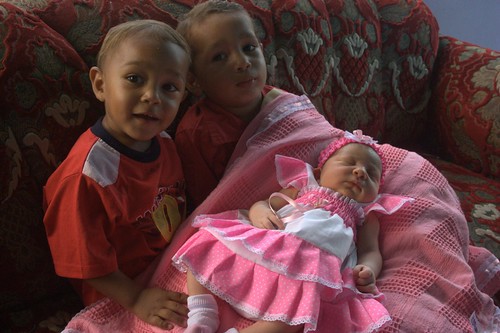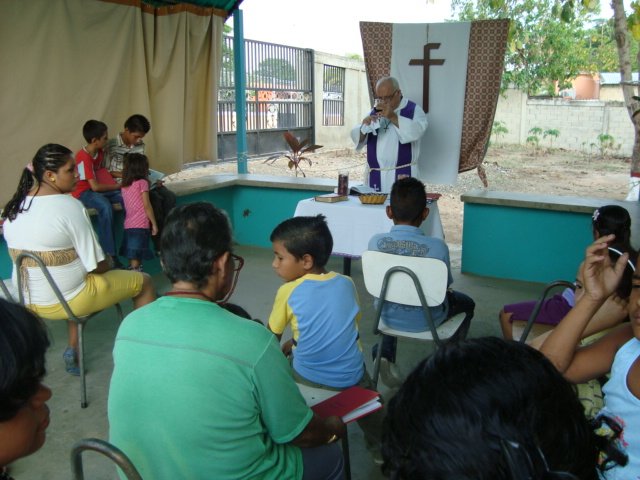Jhoan Andres Leal Santana, Luz Maria's 10th grandchild, celebrated his first birthday on January 30, 2014. It was an opportune moment for us to give thanks for the gift of his life on Sunday, February 2, the Feast of the Purification of Mary and the Presentation of our Lord.
This is the last story of the baby
Jesus recorded in the four Gospels perhaps depending on when the
visit of the Magi may have occurred). Explaining just what it means
may require a certain amount of delicacy, depending on your audience.
What is this talk of purification and sacrifice? Why did Mary need to
be purified and why did the baby Jesus need to be declared holy
before the Lord? One needs to read and understand the 12th chapter of
Leviticus.
“And the LORD spake unto Moses,
saying, Speak unto the children of Israel, saying, If a woman have
conceived seed, and born a man child: then she shall be unclean seven
days; according to the days of the separation for her infirmity shall
she be unclean. And in the eighth day the flesh of his foreskin shall
be circumcised. And she shall then continue in the blood of her
purifying three and thirty days; she shall touch no hallowed thing,
nor come into the sanctuary, until the days of her purifying be
fulfilled. But if she bear a maid child, then she shall be unclean
two weeks, as in her separation: and she shall continue in the blood
of her purifying threescore and six days. And when the days of her
purifying are fulfilled, for a son, or for a daughter, she shall
bring a lamb of the first year for a burnt offering, and a young
pigeon, or a turtledove, for a sin offering, unto the door of the
tabernacle of the congregation, unto the priest: Who shall offer it
before the LORD, and make an atonement for her; and she shall be
cleansed from the issue of her blood. This is the law for
her that hath born a male or a female. And if she be not able to
bring a lamb, then she shall bring two turtles, or two young pigeons;
the one for the burnt offering, and the other for a sin offering: and
the priest shall make an atonement for her, and she shall be clean.”
The post-natal discharge of blood from
a woman's womb was considered to be “impure” as was her normal
menstrual discharge. This meant that for a week after giving birth to
a son, or two weeks after giving birth to a girl, a woman could not
engage in sexual intercourse, or in the preparation of food or other
household chores. After this initial period of isolation, a woman was
free to perform the ordinary duties of the household, but for 33 days
in the case of a male child, or 66 days in the case of a female, she
could not take part in sacrificial meals, the Passover and other
festivals, nor was she permitted to enter the court of the Temple in
Jerusalem. The flow of blood often continued past the initial week to
two weeks, but was not believed to pass the impurity to other people
during the latter period. The longer period of time for the girl
child did not mean that girls were inferior, but rather reflected an
observation that the post-natal discharge tended to last longer for
girls than boys. The required sacrifice was the same for both boys
and girls.
So what is this all about? It may seem
very strange to the modern mind. Here is one way that one might
approach an explanation. At Mount Sinai, God made a pact with the
people of Israel: If they would worhip Him exclusively as their God
and obey His commands, He would make of them a great nation, give
them a land where they could live in peace and prosperity, and
prepare them for the coming of the Messiah, the promised Savior of
the world, among them. Moses, by the command and power of God, had
brought them out of Egypt, cross the Red Sea and to Mount Sinai as
part of their journey to the Promised Land. But liberty is more than
an outward state. Outwardly, the Israelites had escaped the
oppression of the Egyptians, but inwardly they still were slaves and
fugitives. To live as free men and women, they needed to learn to
take responsibility for their own actions before God. The Law that
God provided them through Moses was a complete guide to achieving
this, on every level from the national to the interpersonal. Much of
this Law of Moses fully reveals the universal moral law, God's design
for how all human beings should live. Honor your father and mother,
do not steal, do not commit murder or adultery, love God above all
else. The moral law reveals the righteousness of God.
But part of the Mosaic law dealt
specifically with how the Israelites were to worship their God in
anticipation of the Messiah. The worship of Israel's God revolved
around an annual cycle of sacred meals and sacrifices, all of which
affected every aspect of daily life. The rules which governed this
worship are called the “ceremonial laws” and were intended to
teach the Israelites the holiness of God. Central to the ceremonial
law was the concept of ritual “impurity.” Those who would
approach God in prayer and worship had to be cleansed of all that
would be inappropriate to bring into God's presence.
Often people think these ceremonial
laws were based on health or sanitary considerations in an era before
refrigeration and chemical preservatives, such as the prohibitions
against eating pork or shellfish. An improved level of health may
have been one consequence of following the Old Testament dietary
laws, This, however, was not the main point, and it is hard to make
sense of some of the ceremonial laws from the perspective of human
health.
The point of the ceremonial laws was to
utterly distinguish the worship of Israel's God from that of the
pagan gods of the cultures which surrounded Israel. The pagan worship
amounted to the practice of witchcraft and necromancy, in which
totemic words and substances could be used to entice, or even
command, the favor of powerful spirit-beings. One such substance was
blood from a woman's womb. To declare it “impure” was to
de-sacralize it, to divest it of any magic power.
Some things designated as ritually impure because of their association with pagan worship, were punishable by death because they also were violations of the moral law, such as sacrificing one's children to the god Moloch (Leviticus
20:2-5, which may be compared to the practice of abortion nowadays)
or the practice of homosexuality (Leviticus 20:13). However, in most forms of “defilement”, such as the
eating of shellfish (9-12), the offender was only escluded from the
sacred meals and worship in the Temple until proper rites of
purification had been observed. This is one answer to the so-called
“shellfish argument” (Why take seriously the condemnation of
homosexuality in Leviticus when only orthodox Jews today pay any
attention to the prohibition against shellfish?). Leviticus does not
place these offenses on an equal level. Also New Testament teaching
makes it clear that the condemnation of homosexuality is not just a
ceremonial law, but belongs also to the moral law (do not commit
adultery) which still is binding on New Testament believers.
Also central to Old
Testament worship was the concept of sacrifice. There were sacrifices
of thanksgiving and “sin offerings” for the propitiation of sins.
A sin offering was required even for the birth of a child. But the
Old Testament sacrifices had no virtue in themselves, only as
foreshadowings of the great propitiatory sacrifice by the one
spotless Lamb of God. So when the baby Jesus was brought to the
Temple for the first time, something new happened. He had been
circumcized eight days after His birth, according to the Law of
Moses, and His mother had brought the sin offering, according to the
Law of Moses. So would begin the fulfillment of the entire Old
Testament Law, both moral and ceremonial by Christ in our stead.
Because of His sinlessness, His death on the cross would meet the
demands of God's righteousness and pay for the sins of all forever,
we need not offer animals for sacrifice in our places of worship.
Because we are covered by His divine holiness in baptism, we need not
worry about what we may touch or what we may eat before entering the
presence of God.
This is why there is a moment of
epiphany, or revelation of the Christ Child's divinity, when old
Simeon takes Him in his arms and declares, “Lord, now lettest thou
thy servant depart in peace, according to thy word: For mine
eyes have seen thy salvation, Which thou hast prepared before
the face of all people; A light to lighten the Gentiles, and the
glory of thy people Israel. “ Amen.









![Reblog this post [with Zemanta]](http://img.zemanta.com/reblog_e.png?x-id=b29f4622-4df4-489d-8ad9-ca9358a3eee2)